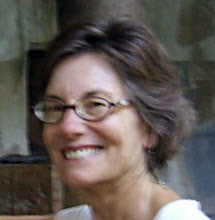Lying in bed in the morning, I listen to the sounds of the city, buzzing and humming. The contrast from the quiet weekend is stunning. When I return to Beirut -- insha Allah, I will remember those three days of total quiet, which were like an early Sunday morning on Sixth Avenue in Manhattan. Beiruti's have a reputation as chaotic drivers. There are no rules and everyone taps their horn to alert the next guy that they are 1/2 inch away. Usually it is a short beep or two. Behind the closed curtains on the fourth floor I hear their individual "voices"...a wide register of tones, from deep to chirpy to choral to authoritative, bark out. The vehicles range from zipping mosquito scooters to growling trucks. It is easy to anthropomorphize this city.
Beirut's streets are clean but after years of war and non-stop reconstruction, it has dusty broken sidewalks, which remind me of Mitte in Berlin, where the deep ravages of war show in each section that hasn't yet been renewed.
The downtown has been reconstructed faithfully to its pre-war plan, with exceptional design and materials. The goal, this time around, was to make it better than before. The attractive result is Disneyesque, but it will probably grow into itself and look great in twenty years, if war can be avoided that long.
My Brazilian roommate, Carolina, says Beirut feels like Sao Paolo. It doesn't remind me of the Latin or Asian cities I've seen. It feels Middle Eastern, but with more verve and attitude than, say, Istanbul. It has an Arab and European vibe. I've heard that it is actually hard to learn Arabic here because everyone speaks back in French or English.
Beiruti's demonstrate a joie de vivre that contrasts with tanks in the street and lends its citizens a poignant gravitas. They are hardy and not easily intimidated. Rockets from unfriendly neighbors, even when the neighbors are fellow Lebanese, are not going to stop them -- hence the constant and rapid reconstruction.
I am doing my best to keep up with this blog. Until I reach Cairo, however, my posts may be brief. The Beirut Exchange program is richly dense and intense. We begin each day at 9am with Arabic classes. HARD! I'm struggling with basics, like figuring out how to organize my notes, because I have to write them left to right, while writing Arabic right to left. We have a lunch break and then seminar/lectures each afternoon and evening. Nicholas Noe, the organizer has incredible access to political, religious, educational and media figures in Lebanon. He keeps trying to find minutes that don't exist to add in additional voices. I am unlikely to learn much about the Beirut art scene -- those three dead days of the election would have been my chance.
The remarkable group of participants are highly informed on the region's issues. Ron, a fifty year old African American who owns and runs a business in South Africa and I are the old ones. There are two other Americans, one other South African, two young Brits, an Italian, a Canadian, two Germans, a Slovakian, a Norwegian, and a Brazilian. Ron and I both feel privileged to be around these young people who range in age from early 20s to mid 30s. Kai, the Norwegian is an Arabic teaching academic, and probably in his 40s. When I was in college as an young undergrad, my worries were about my boyfriends and my grades. While I'm sure those two things preoccupy these kids too, they know and want to be part of the conflicted world beyond the borders where they were born.
Last night we were at a reception and I met the U.S. Ambassador (Ambassadress, actually). Today, Sunday, we had a field trip to the Roman temple ruins at Baalback in the Beqaa Valley. More next time. I now have to sign off and go do my Arabic homework, with what remains of my energy.
Saturday, June 13, 2009
Subscribe to:
Post Comments (Atom)

Ginney,
ReplyDeleteWhat a priceless opportunity you have been given. Your words paint a vibrant picture of your unfolding days. Send more please!
Allah Maak, Diana
Some Costa Rican men drive like that too. Fatalistic, machisimo driving, No seat belts in their cars. If you find a good slow taxi driver, get their card and call them again. Interesting stories.
ReplyDelete